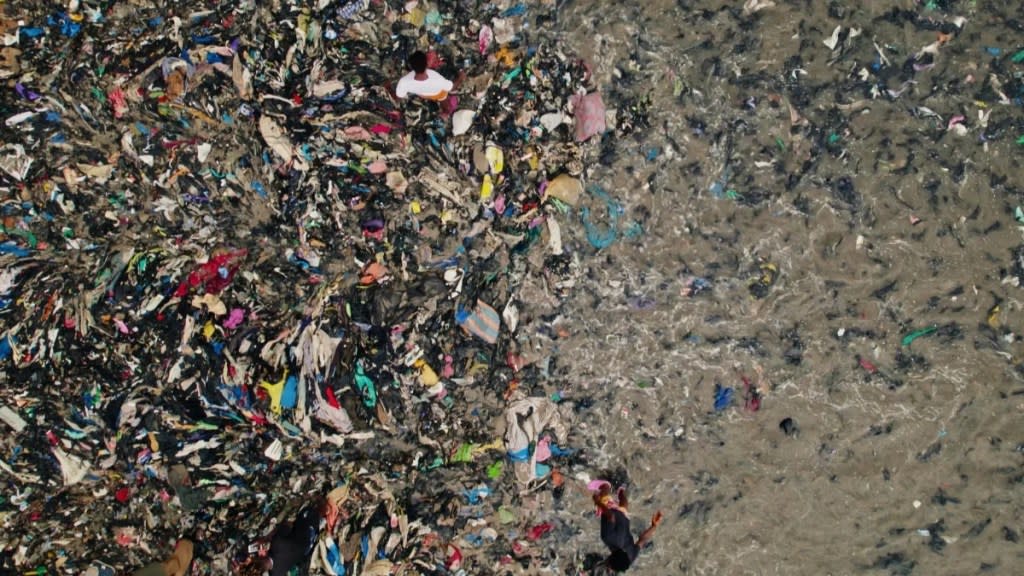‘Brandy Hellville’ Director Eva Orner Says Brand’s Scandal Blew Over in ‘Pure Trumpian Fashion’

- Oops!Something went wrong.Please try again later.
Building upon Business Insider reporter Kate Taylor’s investigative exposé about fashion brand Brandy Melville, Eva Orner pushed her “Brandy Hellville & the Cult of Fast Fashion” documentary to further scrutinize why crowds still line up around the stores and no consequential shutdown of the clothing chain has occurred. That’s despite allegations of a toxic work environment, sexual exploitation, racism and more. The documentary is available on Max.
“I will give it to Brandy for taking the cake in terms of, they’re not just racist. They’re also antisemitic,” Orner said.
The film follows much of what Taylor’s investigative article revealed regarding the culture, sketchy behavior and ramshackle business model of clothing chain Brandy Melville. It took many young girls by storm in the 2010s with the help of Tumblr, Instagram and other social media, with TikTok coming in a bit later.
The doc also traces developments in fast fashion from brands like Zara and Shein, who drop 1,000 pieces of clothing a week. Orner mentioned Nike, Reformation and Gap as well, stressing that Brandy Melville became successful in a generation focused on inclusivity and diversity — unlike American Apparel or Abercrombie “20, 15, 10 years ago.”
“They don’t just exploit young girls, they exploit really young girls. They don’t just exploit them, they make them take photos of them every day and then they send them to the owner,” Orner told TheWrap. “He keeps them in a dossier. They don’t just take full-body photos. They take photos of their breasts and their feet. They put a buzzer next to the cash register so that he could prompt the teenage employee to take a photo of someone.”
“It just goes on and on and on, and the fact that they have already been exposed by Kate Taylor’s brilliant exposé that triggered this, and then nothing happened — they didn’t respond, and it went away in pure Trumpian fashion,” Orner said.
Her desire to make the documentary was twofold: to redirect the exposure and free marketing of TikTok, as well as settle the brand’s involvement in the greater context of the wasteful practices of the fashion industry.
“I thought it would be really easy to find people to talk,” Orner said. “It’s about fashion. I do a lot of films in war zones and with refugees, and I went, ‘This is the hardest film I’ve ever — I haven’t been able to find people who will talk to me,’ and I spoke to hundreds and reached out to hundreds of girls, young women, ex-employees at Brandy. Most of them were scared to talk, scared of retribution, scared of the company, scared of [founder] Stephan [Marsan].”
“It’s this really interesting thing about how important whistleblowers are, yet how increasingly scared they’re becoming, especially because they’re so young,” Orner said. “They’re my heroes, the women in this film who just said ‘yes.’ There’s a lot of power in young women … and instead of being manipulated by companies to do this fake advertising for them where they’re not even paid, turn it into something more powerful.”
HBO brought Orner the Brandy Melville story after she expressed wanting to make a film about fast fashion. She then sought to shed light on the greater effects of fast fashion in the world today.
“I made things harder on myself. It would have been easier just to tell the Brandy story, but I think it’s more valuable to have more context for the audience,” Orner said. She added that HBO was open to the idea of making the story bigger as she looked to show the background of how fast fashion arrived where it is today.
Orner spent time filming scenes in Prato, Italy, a fast fashion hub — where articles of clothing are produced to be worn four or five times before they get discarded. The city’s mayor, Matteo Biffoni, admitted that enforcement personnel who are supposed to ensure legitimate and safe practices in Prato have discovered slave labor there.
The documentarian also featured members of the OR Foundation andshowed the situation in Accra, Ghana. That’s a port city where the United States dumps clothes that go in the trash. It also examines employees and laborers who practice sustainable methods at the Kantamanto Market, the world’s largest secondhand economy.
“The last seven, eight years, I really wanted to buy sustainably and consciously, and I thought I was,” Orner said. “Every company I bought from had labeled things sustainable, and I started looking into it because [I noticed], ‘This is still made in China and it doesn’t say where the factory is and the condition of the workers and the environmental impact it’s having.’ Everything was really opaque.”
“I kept coming across stories about greenwashing, where they’re just saying something is sustainable, but it’s not,” Orner said. “And then I realized that the global fashion industry is completely unregulated. There’s not even an agreed upon meaning or definition of the word ‘sustainable.’ [A company] can have 100 pieces of clothing in [a] line, and have one organic T-shirt, and you can say you’re sustainable — so it’s complete greenwashing.”
“Brandy Hellville & the Cult of Fast Fashion” is now streaming on Max.
The post ‘Brandy Hellville’ Director Eva Orner Says Brand’s Scandal Blew Over in ‘Pure Trumpian Fashion’ appeared first on TheWrap.

